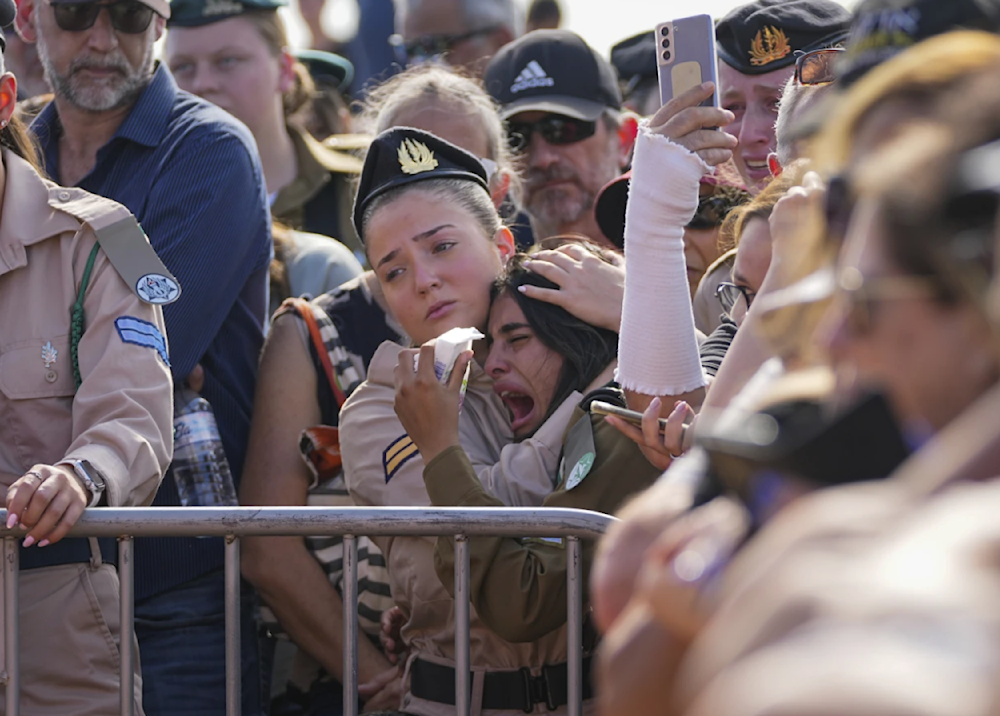Trauma, suicide plaguing Israeli soldiers upon return from Gaza: CNN
The Israeli occupation has revealed that it provides care for thousands of soldiers suffering from post-traumatic stress disorder or mental health issues resulting from their experiences in the war on Gaza.
-

Israelis attend a funeral in occupied territories on October 17, 2023. (AP)
A mother of an Israeli occupation forces (IOF) member who took his own life has told CNN that what he saw in Gaza may have haunted him.
According to the mother, Eliran Mizrahi returned as a "different person", traumatized by the war on Gaza and often describing seeing "invisible blood" to his family. “Because of the army, because of this war, my brother is not here," his sister stated.
Mizrahi spent 186 days operating a D-9 bulldozer before being injured by an RPG attack. After being pulled out for treatment, he was diagnosed with PTSD in April and began receiving weekly therapy. Two days before he was to return, he killed himself.
The Israeli occupation has revealed it provides care for thousands of soldiers suffering from post-traumatic stress disorder or mental health issues resulting from their experiences in the war on Gaza. The IOF have not given an official number of how many members have committed suicide, but one medic told CNN anonymously that many "do not trust the government right now."
Israeli soldiers who fought in Gaza told CNN that they witnessed horrors that the outside world could never truly understand.
Data show that more than a third of IOF members who have been removed from combat suffer from mental health issues. The Israeli Ministry of Security's Rehabilitation Department noted that every month, over a thousand new soldiers are removed from combat for treatment, with 35% complaining about their mental state and 27% experiencing “a mental reaction or post-traumatic stress disorder.”
By the end of 2024, nearly 14,000 wounded Israeli soldiers are expected to receive treatment with 40% likely to face mental health issues. An IOF medic told CNN that some young soldiers experienced mental trauma and often cried or showed signs of emotional numbness.
Israeli authorities have largely restricted access to Gaza for foreign journalists, making it challenging to document the suffering of Palestinians fully. Meanwhile, Israeli occupation soldiers shared with CNN the horrors they witnessed, shedding light on the brutality of occupation Prime Minister Netanyahu’s "forever war".
The co-driver of the bulldozer used by Mizrahi, Guy Zaken, expressed that "we saw very, very difficult things," adding that they are “things that are difficult to accept."
Zaken said he can no longer eat meat, as it reminds him of the gruesome scenes he witnessed from his bulldozer in Gaza, and struggles to sleep at night, the sound of explosions ringing in his head.
“When you see a lot of meat outside, and blood… both ours and theirs, then it really affects you when you eat,” he told CNN, referring to bodies as “meat.”
Meanwhile, the medic who spoke to CNN on condition of anonymity admitted a mistrust in Palestinians in Gaza at the outset of the war but noted that some attitudes alter "when you actually see Gazan civilians in front of your eyes."
Ahron Bregman, a political scientist at King’s College London who served in the IOF previously, called this war unlike any other fought by "Israel", being "very long" and "urban", which means that soldiers fight among many people, “the vast majority of them are civilians.”
“They go over them,” he admitted.
Bregman further questioned, “How can you put your children to bed when, you know, you saw children killed in Gaza?”
The Israeli newspaper Haaretz reported that 10 soldiers took their own lives between October 7 and May 11, according to military data. When CNN inquired about the number of suicides in the IOF since the war, Uzi Bechor, a psychologist and commander of the IOF’s Combat Response Unit, revealed it was not permitted to divulge such figures and claimed the suicide rate in the IOF was "stable".
In 2021, suicide was the leading cause of death among soldiers, with at least 11 soldiers reported to have taken their own lives, according to the Times of Israel.

 4 Min Read
4 Min Read









